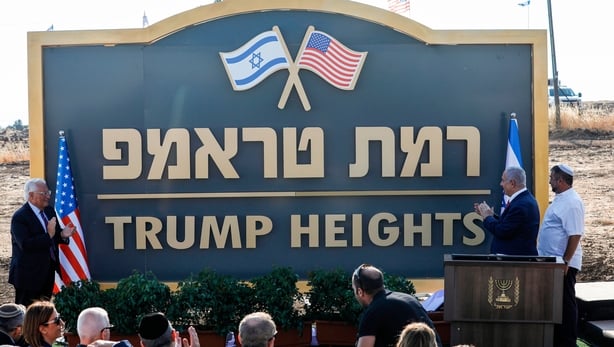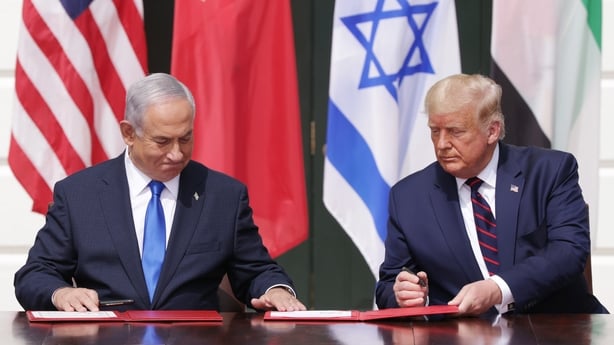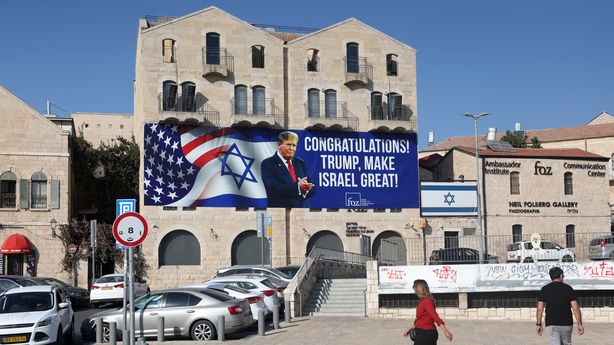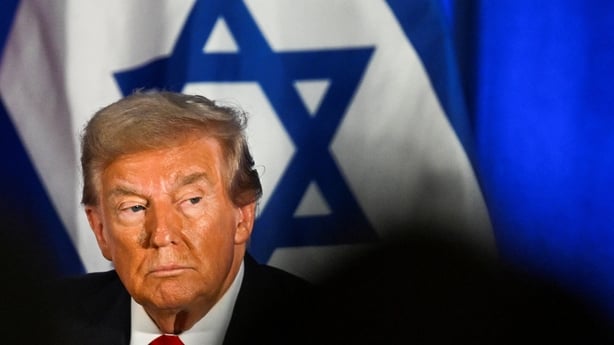Benjamin Netanyahu has previously described Donald Trump as the best friend Israel has ever had in the White House.
This week, the Israeli prime minister was one of the first world leaders to congratulate him after his election, describing it as "history's greatest comeback".
Mr Netanyahu's enthusiasm is not surprising.
During his first term in office, Mr Trump proved himself to be one of Israel's most-devoted champions.
His first trip abroad was to Israel. And, much to Israel's delight, the US president-elect expressed an almost gleeful disregard for decades of US policy on the Middle East.
The Republican moved the US embassy from Tel Aviv to Jerusalem, becoming the first US president to recognise the holy city as the country's capital.

During his presidency, the US officially recognised the Golan Heights - which is considered to be part of Syria under international law - as Israeli sovereign territory.
Mr Trump also became the first sitting American president to pray at the Western Wall, the holiest site in Judaism.
And, in 2018, the former president withdrew US funding from UNRWA, the United Nations agency for Palestinian refugees - long before the UN agency was subjected to the level of controversy it has faced in the wake of the 7 October 2023 Hamas attacks.
Mr Trump has repeatedly described himself as the most pro-Israel US president ever - going so far as to say that no president had ever done more for Israel.
Even Israel's ultranationalists seem to agree.
Itamar Ben-Gvir, the country's far-right national security minister, tweeted in excitement when it looked likely that Mr Trump would beat Kamala Harris in the US election earlier this week.
Yesssss 💪🏻🇮🇱🇺🇸 https://t.co/kPqkYI3PDP
— איתמר בן גביר (@itamarbengvir) November 6, 2024
It's not hard to see why.
Under Trump's presidency, the US State Department announced that it would stop considering Israeli settlements in the Occupied West Bank and East Jerusalem as "inconsistent with international law."
Those settlements are typically described as illegal Israeli settlements for a reason - they are situated in territory that is internationally recognised as belonging to the Palestinians.
That Trump-era policy was subsequently reversed under the Joe Biden administration – but it would be no surprise to anyone if it is reinstated during Mr Trump's second term.
Read more: Trump and the EU: Everything Everywhere all at Once
At its core, the Israeli-Palestinian conflict is a modern territorial contest - two nations, one land.
Israel has rapidly expanded settlements in the West Bank in recent years, and the pace has only increased since 7 October.
By some estimates, around 40% of Palestinian territory in the West Bank and East Jerusalem is now comprised of illegal Israeli settlements.
That is one huge and highly obvious impediment to reaching a two-state solution as so much of what should be Palestinian territory has been encroached upon.
And this is exactly why Hamas cited the illegal Israeli settlements as a justification for the 7 October 2023 attacks. Ultimately, Israel's actions are part of a chain of events that has led to the all-out war that has raged between Israel and Hamas since then.
The biggest question, of course, is how Mr Trump's staunch support for Israel will impact the conflict with Hamas and whether he can actually bring about an end to the war in Gaza, as he repeatedly promised on the campaign trail.

The Republican reportedly told Mr Netanyahu in July that he wanted the war wrapped up by the time he returns to office.
However, it's not even clear what "wrapping up" the war would entail in Mr Trump's eyes.
For one thing, Israel has floated the idea of a permanent presence in Gaza even after it winds down hostilities.
That is a non-starter for Hamas, which has pledged to continue fighting and holding onto the Israeli hostages unless Mr Netanyahu's government agrees to a full withdrawal as well as a permanent ceasefire.
At their core, all efforts to reach a ceasefire, and an end to the war, have failed because Israel and Hamas have two utterly divergent war aims:
Hamas wants to survive the war, to be able to fight on after a ceasefire whereas Israel wants to "totally obliterate" Hamas, and will only agree to a temporary ceasefire, so that it can return to fighting and achieve that goal.
Bridging that gap is unlikely, no matter how forcefully Mr Trump demands it.
And just as much as he is pro-Israel, he is also pro-Netanyahu.
The new US president is likely to grasp that, in many senses, Mr Netanyahu's survival as prime minister is contingent on the continuation of the war on all fronts.

The so-called forever wars, Mr Netanyahu seems to believe, could be key to his re-election with some speculation that the Israeli leader could call a snap election sometime next year, which would be far sooner than expected.
If anyone understands political survival and the things one needs to do to achieve it - it is the 45th and soon to be 47th president of the United States.
In that sense, it's very hard to see Mr Trump applying too much pressure on his Israeli ally.
Instead, history would suggest he will be granted additional leeway in the coming months, at least until Mr Trump runs out of patience.
It's a similar story with the man who is tipped to take over as US Secretary of State, Richard Grenell.
Mr Grenell, who served in various positions during the first term administration, said in a recent interview that Mr Trump's goal was "peace".

But it sounds very much like peace on Israel's terms.
"You can't talk about a two-state solution when you have Hamas, a terrorist organisation, leading one side. It's unacceptable," he said.
"You can't talk about a two-state solution when one side is literally holding people hostage."
Read more about the conflict in the Middle East
Mr Grenell has pointed to the Iranian financing of Hamas, Lebanon's Hezbollah group and Yemen's Houthi militia to back up his claims.
"What Donald Trump wants to see is peace. And, to have peace, you have to go to the source of what's happening, and how the Houthis, Hamas, Hezbollah – where they're getting their money from," he said.
That sounds very much like a second Trump presidency will once again reinstate its "maximum pressure" policy on Iran - a policy that involved stringent sanctions on the country's oil industry during Mr Trump's first term as president.
However, it also sounds like the Trump administration will have no time for Hamas or its war aims, which makes the prospect of a ceasefire that would actually end the bloodshed feel all the more unattainable.





